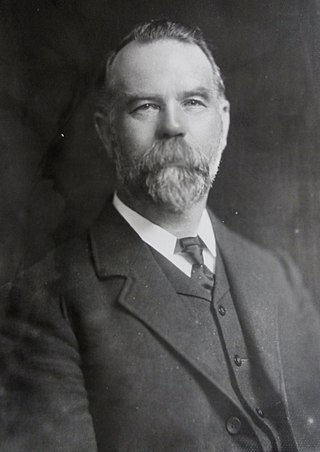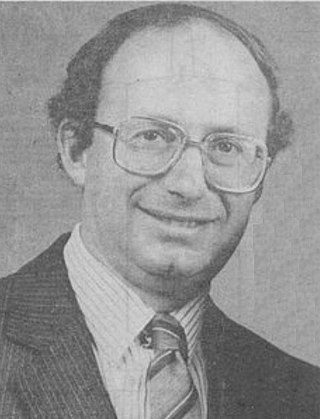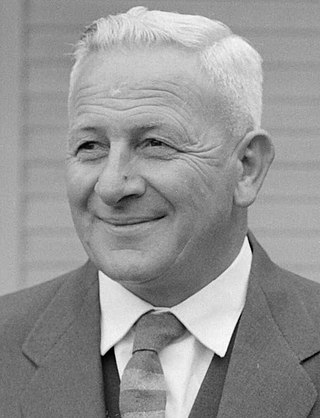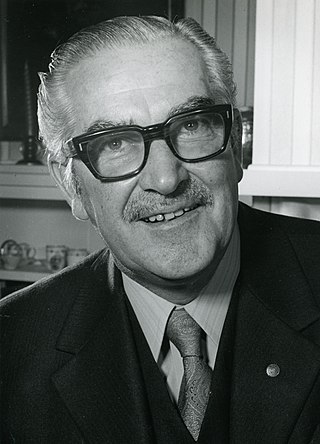
Sir Francis Joseph Kitts was a New Zealand politician. He was the longest-serving mayor of Wellington, holding the post from 1956 to 1974. He was the Labour Member of Parliament for Wellington Central between 1954 and 1960.

Sir Robert Lachlan Macalister was the Mayor of Wellington from 1950 to 1956, and had been the acting mayor for five months in 1948 during the absence overseas of Will Appleton.
The 1915 Wellington City mayoral election was part of the New Zealand local elections held that same year. In 1915, elections were held for the Mayor of Wellington plus other local government positions including fifteen city councillors. John Luke, the incumbent Mayor, retained office tallying just ten votes fewer than he did two years earlier. The standard first-past-the-post electoral method was used to conduct polling.

The 1917 Wellington City mayoral election was part of the New Zealand local elections held that same year. In 1917, elections were held for the Mayor of Wellington plus other local government positions including fifteen city councillors, also elected biannually. The polling was conducted using the standard first-past-the-post electoral method.

The 1933 Wellington City mayoral election was part of the New Zealand local elections held that same year. In 1933, elections were held for the Mayor of Wellington plus other local government positions including the fifteen city councillors, also elected biannually. Thomas Hislop, the incumbent Mayor sought re-election and retained office unopposed with no other candidates emerging. The polling was conducted using the standard first-past-the-post electoral method.

The 1941 Wellington City mayoral election was part of the New Zealand local elections held that same year. In 1941, elections were held for the Mayor of Wellington and fifteen city councillors plus seats on the Wellington Hospital Board and Wellington Harbour Board. The polling was conducted using the standard first-past-the-post electoral method.

The 1944 Wellington City mayoral election was part of the New Zealand local elections held that same year. In 1944, election were held for the Mayor of Wellington plus other local government positions including fifteen city councillors. The polling was conducted using the standard first-past-the-post electoral method.
The Wellington Citizens' Association, was a right-leaning local body electoral ticket in Wellington, New Zealand. It was formed in 1911 by merging the selection process of council candidates of several civic interest groups and business lobby groups. Its main ambitions were to continue to control the Wellington City Council, reduce local spending and deny left-leaning Labour Party candidates being elected.

Ernest Richard Toop was a New Zealand politician and businessman.

The 1950 Wellington City mayoral election was part of the New Zealand local elections held that same year. In 1950, elections were held for the Mayor of Wellington plus other local government positions including fifteen city councillors. The polling was conducted using the standard first-past-the-post electoral method.

The 1956 Wellington City mayoral election was part of the New Zealand local elections held that same year. In 1956, elections were held for the Mayor of Wellington plus other local government positions including fifteen city councillors. The polling was conducted using the standard first-past-the-post electoral method.

The 1962 Wellington City mayoral election was part of the New Zealand local elections held that same year. In 1962, elections were held for the Mayor of Wellington plus other local government positions including fifteen city councillors. The polling was conducted using the standard first-past-the-post electoral method.

The 1965 Wellington City mayoral election was part of the New Zealand local elections held that same year. In 1965, elections were held for the Mayor of Wellington plus other local government positions including fifteen city councillors. The polling was conducted using the standard first-past-the-post electoral method.

The 1968 Wellington City mayoral election was part of the New Zealand local elections held that same year. In 1968, elections were held for the Mayor of Wellington plus other local government positions including fifteen city councillors. The polling was conducted using the standard first-past-the-post electoral method.

The 1971 Wellington City mayoral election was part of the New Zealand local elections held that same year. In 1971, elections were held for the Mayor of Wellington plus other local government positions including fifteen city councillors. The polling was conducted using the standard first-past-the-post electoral method.

The 1983 Wellington City mayoral election was part of the New Zealand local elections held that same year. In 1983, elections were held for the Mayor of Wellington plus other local government positions including eighteen city councillors. The polling was conducted using the standard first-past-the-post electoral method.

Cecil Henry "Matt" Benney was a New Zealand civil servant and politician.

The 1959 Lower Hutt mayoral election was part of the New Zealand local elections held that same year. The elections were held for the role of Mayor of Lower Hutt plus other local government positions including fifteen city councillors, also elected triennially. The polling was conducted using the standard first-past-the-post electoral method.

The 1971 Lower Hutt mayoral election was part of the New Zealand local elections held that same year. The elections were held for the role of Mayor of Lower Hutt plus other local government positions including fifteen city councillors, also elected triennially. The polling was conducted using the standard first-past-the-post electoral method.













